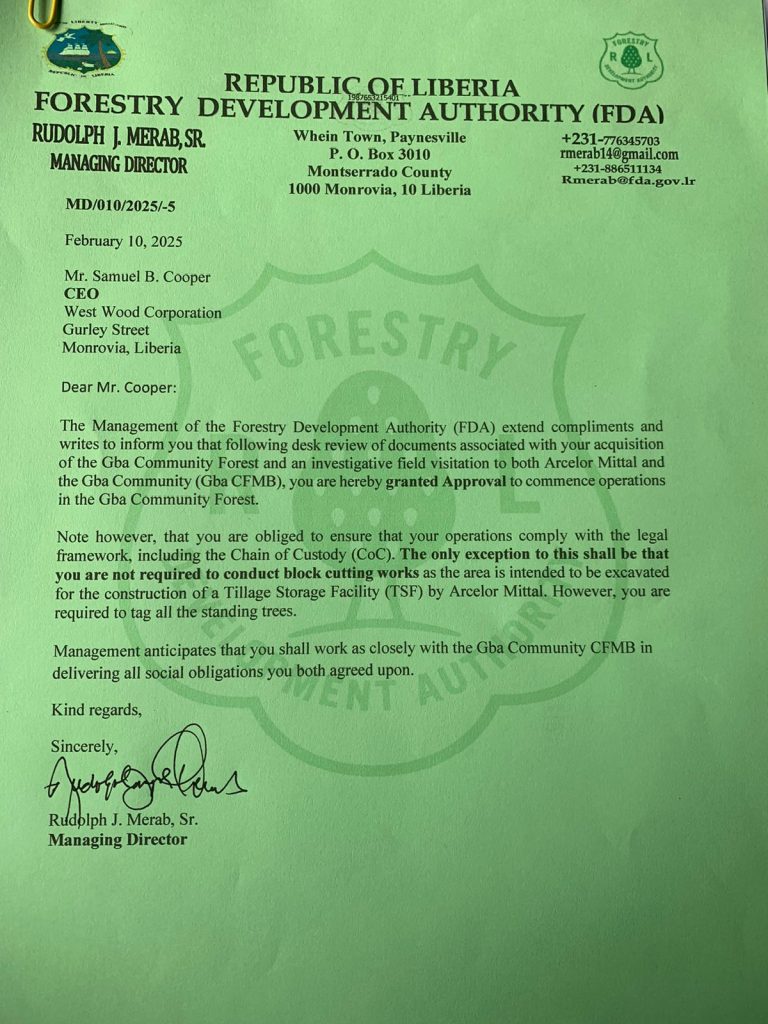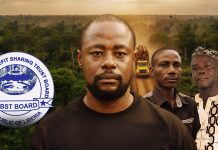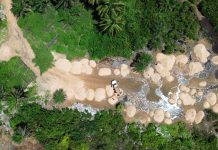Top: The stump of a tree Westwood Corporation harvested outside a 450-acre authorized area in the Gba Community Forest, based on satellite imagery. The evidence also established that the firm even harvested outside the community forest. The DayLight/James Flomo
By Esau Farr and James Flomo
SEHYI-GEH – Earlier this year, Westwood Corporation, a firm with no known logging experience, harvested timber outside its authorized area in the Gba Community Forest in Nimba’s Yarmein and Sanniquillie-Mahn Districts, a DayLight investigation has found.
In 2016, ArcelorMittal Liberia signed an MoU with Gba, giving the community US$150,000 to clear 450 acres of rocky forestland to construct a mine waste plant. However, Gba misapplied the money and turned to loggers to do the job multiple times in eight years.
Those efforts failed until this January this year, when Gba signed the agreement with West Wood, known for roadworks. The agreement included logs that previous companies had abandoned in the 11,538-hectare forest.
Westwood soon began the felling, and exported 216 logs (921.124 cubic meters) in two March shipments, according to the FDA’s records. An initial DayLight investigation found that the exports were illegal in several ways. The logs had been harvested under an agreement that did not match a legal forestry contract. The logs were exported to Europe despite not being from a legal source, violating Liberia’s timber trade agreement with the European Union.
But this investigation established that things were a lot worse. Geolocations of tree stumps with Westwood tags show the company harvested outside the designated area, apparently targeting expensive, first-class timber. Reporters photographed a dirt road that the company paved inside the forest to access the logs.
Using official dataset and geolocation technology, The DayLight used coordinates fitted into pictures taken of stumps of trees Westwood harvested to draw a map, exposing the illegal harvest.
It was unclear how many logs were illegally harvested. However, DayLight estimated 250 first-class logs in the Makingo Town. Their species—ekki and niangon—matched those Westwood exported in March.

Westwood’s activities were an open secret. Three DayLight visits found that people and the Gba leadership were aware of the illegal harvest.
“They went to Gbarpa, where they did not send them, felled logs and carried them,” said Paul Gahnto, Sehyi-Geh Town’s assistant youth chairman.
The illegal harvesting adds to Nimba’s deforestation. Between 2002 and 2024, Nimba recorded 393,000 hectares of tree cover loss, second only to Bong (434,000 hectares), according to Global Forest Watch, which tracks countries’ deforestation. A tree cover is any vegetation that is at least three meters high.
World Heritage Site
The illegal harvest is counterproductive to a region known internationally for conservation.
Gba and its neighbors—Blei, Sehyi Ko-doo and Zor—serve as a buffer with East Nimba Reserve, a part of the Nimba Reserve, a UNESCO World Heritage Site, running through Guinea and the Ivory Coast. The region is home to the Nimba flycatcher, the Nimba toad and other endangered and common species.
Based on the region’s importance, Gba and the other communities have an agreement with the Liberian government and ArcelorMittal to protect the forest there. As part of the agreement, the steel giant supports the communities’ conservation programs, including a monthly stipend for forest guards and tree planting.
Gba, in particular, has also received support for its conservation from other institutions. It had been established by a USAID project and continued to receive support from the United States Forest Service. Since 2023, Social Entrepreneurs for Development (SESDev) has worked with Gba’s leadership to strengthen its governance mechanism.
Westwood adds to the list of companies Gba has contracted to clear the controversial 450 acres. In 2016, LTTC Thanry signed a contract with Gba but did not deliver. Later in 2021, Six S International entered the picture, but, like LTTC Thanry, it failed.


Before those deals, Gba was among several community forests whose status the FDA’s board canceled in 2014 for errors. The agency had mistakenly combined Gba with Zor and had to be split into two community forests.
‘Hereby granted’
The Forestry Development Authority played a part in the illegal harvest. Managing Director Rudolph Merab ignored legal requirements and authorized West Wood.
In normal logging practices, the FDA counts and marks trees in a mapped area before harvest. Then, there are FDA fieldworkers who monitor the process and verify the legality of the log before export.
In Gba’s case, a warning letter replaced that rule, even though more crucial, given the nature of the harvest.
“You are obligated to ensure your operations comply with the legal framework,” wrote Merab. “You are required to tag all standing trees.
“You are hereby granted approval to commence operation in the Gba Community Forest.”
Interestingly, Merab lowered the bar Mike Doryen, his immediate predecessor, had set for Gba. Doryen, whose administration was characterized by forestry offenses, ensured that previous companies obeyed the rules.
Rules aside, the FDA did not verify West Wood’s legal documents before approving its operations in Gba. The company’s article of incorporation does not list its shareholders. The document has only two articles in the legal documents: I and III. This violates the Beneficial Ownership Regulation, which mandates businesses to name the people who own them.

That rule does not only apply when registering a business. It is also a forestry requirement. The Regulation on Bidder Qualifications requires a company’s owners or “significant individuals” to be scrutinized. It curtails conflicts of interest involving public officials and prevents forest resources from being placed into the hands of broke or dishonest individuals.
The FDA and Samuel Cooper, owner of Westwood, did not respond to requests for comments.
The Forestry Development Authority investigated the harvest following the initial DayLight publication, but has not released any report months on. Logging outside an authorized area is a crime, punishable by a fine, imprisonment and penalties.
Nyan Flomo, a Gba leader, fears locals will bear the brunt of West Wood’s actions. Flomo now runs Gba’s affairs due to the death of Samuel Johnson, Gba’s leadership head, in March.
“What we heard is that the FDA will investigate, declare the logs abandoned, auction [them] and give the community its benefits,” said Flomo, who initially supported Westwood and was critical of The DayLight investigation. “We are still looking up to the FDA to give us the [official] outcomes of the investigation they carried out.”
The story was produced by the Community of Forest and Environmental Journalists (CoFEJ).





Facebook Comments